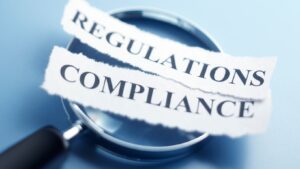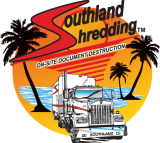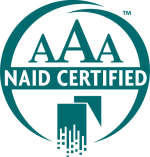
Businesses today face mounting pressure to safeguard critical data and information from fraud threats. However, unfortunately, many organizations lack the protocols to ensure compliance with relevant regulations regarding document destruction. Shredding plays a crucial role in meeting these regulatory standards, yet navigating this process can be complex. In this blog post, we’ll explore the critical intersection of compliance and document shredding.
Overview Of Document Destruction Regulations
Proper document destruction is essential to protecting sensitive information for many industries, especially those governed by HIPAA, FACTA, and GLBA regulations. These regulations mandate that businesses protect the confidential information of customers and employees by implementing secure document destruction practices.
HIPAA
The Health Insurance Portability and Accountability Act (HIPAA) is a federal law in the United States enacted in 1996. HIPAA ensures that individuals’ health information is protected while providing a standardized method for healthcare providers to exchange health information electronically. The law has specific rules and procedures for maintaining the privacy and security of personally identifiable information and establishes numerous rights for individuals concerning their health information. Failure to comply with HIPAA can result in significant fines and penalties for organizations.
FACTA
The Fair and Accurate Credit Transactions Act (FACTA) is a federal law protecting consumer financial information. FACTA requires businesses to implement reasonable measures to protect sensitive data from being accessed, stolen, or misused by unauthorized individuals. The legislation includes provisions for secure disposal of consumer information and penalties for non-compliance.
The Gramm-Leach-Bliley Act And SOX
The Gramm-Leach-Bliley Act (GLBA), also known as the Financial Services Modernization Act of 1999, applies mainly to financial institutions. These institutions must explain their information-sharing practices to their customers and safeguard sensitive data. Hence, proper document destruction is a crucial aspect of GLBA compliance.
On the other hand, the Sarbanes-Oxley Act (SOX) of 2002 applies to all public companies. It was enacted to improve the accuracy and reliability of corporate disclosures in the wake of high-profile business scandals. SOX imposes several internal control requirements on businesses, including safeguarding assets that can impact financial reporting. This includes digital and physical data, thus making document destruction a critical part of SOX compliance.
These regulations apply to paper documents, digital data, and any other mediums containing sensitive information.
Understanding Compliance In Shredding
Compliance in shredding can be complex and may require understanding various rules, regulations, and laws.
Know The Legal Frameworks
Different industries and regions have specific regulations that dictate how sensitive information should be handled and disposed of. Understanding the legal frameworks, such as SOX, HIPAA, GLBA, or industry-specific guidelines, is fundamental to compliance.
Data Privacy
Compliance often revolves around protecting individuals’ privacy. Shredding documents containing personal information is a proactive measure to ensure compliance with privacy regulations.
Data Security
Proper shredding also plays a crucial role in data security. Ensuring that sensitive information is destroyed before it falls into the wrong hands helps prevent data breaches and fraud.
Document Retention Policies
Developing and implementing clear document retention policies is a foundational step. Knowing what documents to keep and for how long helps streamline shredding processes while staying compliant.
Regular Audits And Assessments
Conducting regular audits of document management and shredding processes helps identify areas for improvement and ensures ongoing compliance.
Employee Training
Employees should be well-versed in compliance requirements and the proper procedures for document shredding. Regular training sessions help maintain a culture of compliance within the organization.
Secure Shredding Methods
Choosing the right shredding services provider is critical to ensuring compliance. Look for providers with secure facilities, trained personnel, and a chain of custody process that can be audited.
Different Document Shredding Services
Various document shredding services are available so you can find the right fit for your business. Here are a few options to consider:
On-Site Shredding
On-site shredding involves a secure shredding truck coming to your location and destroying documents on-site. This option provides added security as you can witness the shredding process firsthand.
Drop off Shredding
Drop-off shredding involves taking your documents to a secure facility for destruction. This option is ideal for small amounts of paper and may offer cost savings compared to on-site shredding.
Scheduled Shredding Services
Scheduled shredding services involve the regular pickup and destruction of documents from your location. This option offers convenience and ensures ongoing compliance with document retention policies.
One-Time Purge Shredding
For organizations with a large amount of backlog or one-time shredding needs, one-time purge shredding services can help properly dispose of a large volume of documents at once.
Residential Shredding
Individuals also have a responsibility to comply with document destruction regulations, especially when it comes to personal information. Residential shredding services offer a convenient and secure way for individuals to dispose of sensitive documents. This can include personal financial records, medical records, or any other documents containing personal identifying information.
Document destruction is essential for protecting and safeguarding your company’s sensitive information and staying compliant with emerging regulations. Organizations of all sizes should ensure that they have a secure document destruction plan in place, including implementing the right methods for disposing of documents, utilizing an experienced service provider, and maintaining chain-of-custody records to substantiate their compliance. With Southland Shredding’s reliable and efficient shredding services, you can be confident that your organization meets all necessary compliance requirements. Contact us today to learn more about our secure document destruction solutions.




